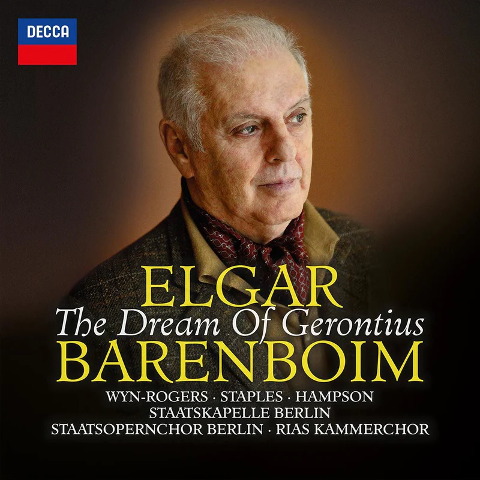Elgar: The Dream of Gerontius
A Reverent Masterpiece: Elgar’s “The Dream of Gerontius”
December 2020
Elgar’s monumental choral work “The Dream of Gerontius” has graced the repertoire for decades, with its profound exploration of life, death, and the soul’s journey after passing. The recording under review, capturing live performances from Berlin last September, features an exceptional ensemble of artists conducted by the illustrious Daniel Barenboim. This rendition not only defies the challenges presented by changes in soloists but also stands as a deeply insightful interpretation of Elgar’s composition.
Andrew Staples takes on the demanding role of the title character, a task he undertook due to the unexpected withdrawal of Jonas Kaufmann. Despite the short notice, Staples delivers a remarkable portrayal. His clear and focused tone, though not the most opulent, suits the role remarkably well. Staples navigates the work’s diverse emotional landscape with intelligence and finesse, seamlessly transitioning from moments of great heft, such as the powerful “Sanctus fortis,” to passages of delicate nuance, like the dialogues with the Angel. Staples’ thoughtful interpretation, coupled with his attention to Elgar’s dynamic markings and note values, reflects his commitment to the text and his genuine understanding of the character.
Catherine Wyn-Rogers, who previously recorded the role of the Angel, brings newfound maturity and sensitivity to her interpretation. Her radiant delivery and nuanced phrasing imbue the role with an unparalleled emotional depth. Wyn-Rogers’ experience shines through as she navigates the complexities of the character’s journey, delivering a performance that is both eloquent and deeply moving. Her interactions with the other soloists and the orchestra are a testament to her artistry, capturing the wonderment and consolation that the Angel embodies.
Thomas Hampson’s contribution, though slightly underwhelming as the Priest, gains strength as he embodies the Angel of the Agony. His imposing yet expressive style brings an air of command to the role, offering a fitting contrast to the gentler moments. Despite minor concerns with projection and pronunciation, Hampson’s performance remains compelling and engaging.
The Staatskapelle Berlin, conducted by Barenboim, presents an orchestral performance that is both richly hued and supple. Their responsiveness and incisiveness underscore the choral and solo performances, creating a harmonious unity throughout the work. Barenboim’s conducting, marked by his willingness to explore expansive tempos, breathes new life into the score. While some choices may appear unconventional, they encourage listeners to engage with the music on a deeper level, making this performance a thought-provoking and distinctive rendition of Elgar’s masterpiece.
The Decca recording captures the dynamics and nuances of the live performance with fidelity, showcasing the orchestra’s robust sound and the subtleties of the vocal performances. Overall, this recording of Elgar’s “The Dream of Gerontius” under Daniel Barenboim’s baton is a deeply considered and superbly performed account that stands tall among the finest interpretations in the discography of this profoundly moving work.

